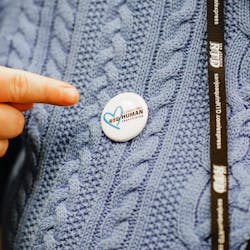Transit spotlights fight against human trafficking in January
January is Human Trafficking Prevention Month in the United States, where government along with private and public partners bring awareness to modern slavery.
The International Labour Organization, Walk Free and International Organization for Migration estimate there are 49.6 million people in modern slavery on any given day, which translates to one out of every 150 people in the world. The U.S. National Human Trafficking Hotline reported there were 10,360 cases identified in 2021 that involved more than 16,700 victims.
Those numbers don’t provide a full assessment of the problem, according to Polaris Project, which operates the National Human Trafficking Hotline. Unfortunately, modern slavery depends on transportation systems for recruitment of potential victims to transporting those victims. To help fight against this, Polaris Project recommends the following for transportation providers:
- Training staff on how to identify/respond to human trafficking
- Display the National Human Trafficking Hotline number in all modes
- Make prevention-based materials available for those individuals who may be traveling into trafficking situations.
The U.S. Department of Transportation’s Transportation Leaders Against Human Trafficking initiative concentrates on five key areas:
- Getting more public, private and cross-modal leaders to focus on problem of human trafficking
- Creating and implementing training protocols
- Developing policy to support the initiative
- Increasing public awareness and outreach
- Promoting information sharing and analysis
On Jan. 18, the Federal Transit Administration (FTA) will host a webinar aimed at preventing human trafficking in Tribal communities. The webinar will explore how modern slavery impacts American Indian/Alaskan Native populations, as well as the role transit agencies can plan in prevention. FTA has also produced a video addressing human trafficking on public transportation.
Transit agencies in action
The Santa Clara Valley Transportation Authority (VTA) said it is retraining all of its employees to spot the signs of human trafficking and how to report it, an effort supported in part with a $350,000 grant from FTA. The transit authority says every incoming new employee receives the training, and all employees will receive renewed training periodically. Additionally, Santa Clara VTA encourages passengers and the public to download its VTAlerts app on mobile devices, which allows reports of suspected human trafficking, as well as other crimes or concerns to be made discretely.
“This initiative will be built into our framework,” said VTA General Manger andCEO Carolyn Gonot. “Our employees are trained to look for the signs, and we hope our riding public will get the message human trafficking happens everywhere and help us to stop it.”
Southeastern Pennsylvania Transportation Authority (SEPTA) has been finding ways to combat human trafficking for many years, including the installation of bilingual signage providing the National Human Trafficking Hotline number, adding a human trafficking report category within its SEPTA Transit Watch app, joining other transit leaders in signing the Transportation Leaders Against Human Trafficking Pledge and, in 2023, the agency is partnering with ENON Tabernacle Baptist Church and the Salvation Army Eastern Pennsylvania and Delaware to raise awareness.
In Vancouver, Wash., C-TRAN will display posters on every bus to connect people with information on how to get help or confidentially report suspicious activity.
“At C-TRAN, we believe that everyone who uses public transportation should be able to travel freely and safely,” said C-TRAN CEO Shawn M. Donaghy. “This small step can make a big difference to raise awareness of the resources that are available to people who are being forced into dangerous situations.”
"We are committed to creating a safe and secure environment for our employees, passengers and community. This event provided RTD staff with the critical information they need to identify signs of human trafficking and help reduce cases and it is a good first step," said RTD CEO Alex Clifford. "We must continue to work together to help prevent human trafficking from happening in our community."
The presentations featured topics on prevention methods, identifying victims of human trafficking, understanding exploitation dynamics and recognizing indicators of possible victimization or recruitment into trafficking situations. Attendees also learned how to report instances of potential trafficking and the importance of online safety through social media awareness.
-----------------------
Need help?
United States:
1 (888) 373-7888
National Human Trafficking Hotline
SMS: 233733 (Text "HELP" or "INFO")
Hours: 24 hours, 7 days a week
Languages: English, Spanish and 200 more languages
Website: http://humantraffickinghotline.org
Canada:
1 (833) 900-1010
Canadian Human Trafficking Hotline
Hours: 24 hours, 7 days a week
Languages: English, French, more than 200 languages total
Transit related human trafficking resources
Federal Transit Administration Human Trafficking Awareness and Public Safety Initiative
https://www.transit.dot.gov/HumanTraffickingAwareness
The American Public Transportation Association Human Trafficking Resource Page
https://www.apta.com/research-technical-resources/safety-security/human-trafficking/
About the Author

Mischa Wanek-Libman
Group Editorial Director
Mischa Wanek-Libman is director of communications with Transdev North America. She has more than 20 years of experience working in the transportation industry covering construction projects, engineering challenges, transit and rail operations and best practices.
Wanek-Libman has held top editorial positions at freight rail and public transportation business-to-business publications including as editor-in-chief and editorial director of Mass Transit from 2018-2024. She has been recognized for editorial excellence through her individual work, as well as for collaborative content.
She is an active member of the American Public Transportation Association's Marketing and Communications Committee and served 14 years as a Board Observer on the National Railroad Construction and Maintenance Association (NRC) Board of Directors.
She is a graduate of Drake University in Des Moines, Iowa, where she earned a Bachelor of Arts degree in Journalism and Mass Communication.

